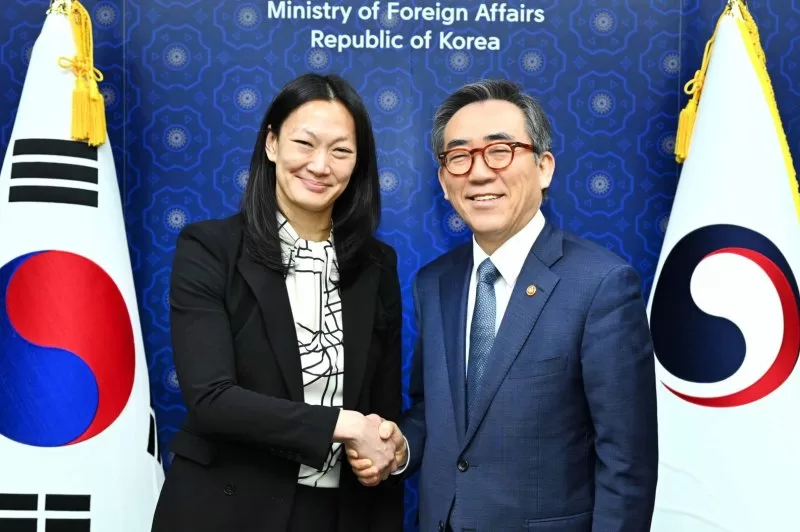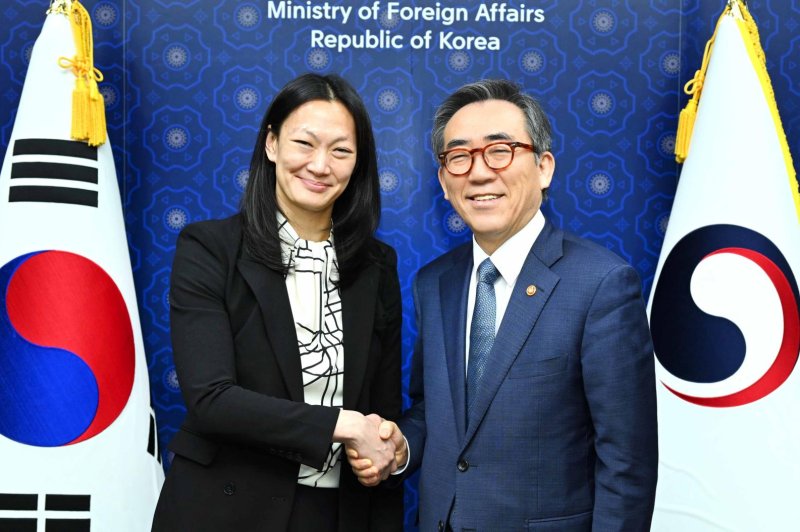1 of 3 | U.S. Ambassador Julie Turner (L), Washington’s top envoy for North Korean human rights, called Monday for a push to send information about the outside world into the North. Turner is on an 11-day trip to Tokyo and Seoul, during which she met with South Korean Foreign Minister Cho Tae-yul (R). Photo courtesy of South Korea Ministry of Foreign Affairs
SEOUL, Feb. 19 (UPI) — Washington’s top envoy for North Korean human rights called Monday for a greater push in sending information about the outside world into the isolated state through broadcasts, leaflets and media such as USB hard drives.
“Now is the time to double down on increasing the free flow of independent information into the DPRK to help equip the citizenry with the information that they so crave,” Ambassador Julie Turner said in recorded remarks at a North Korea-focused forum held in downtown Seoul.
The Democratic People’s Republic of Korea, DPRK, is the official name of North Korea.
“So many organizations based here in Seoul are doing amazing work sending messages to the North Korean people and [reminding] the people of North Korea that we see them and we care deeply for their welfare and dignity,” Turner said.
The event, called the Seoul Freedom Forum, was held to mark the 10th anniversary of the release of the landmark U.N. Commission of Inquiry report on human rights in North Korea.
The 2014 COI report documented North Korean crimes against humanity, including torture, rape, execution, deliberate starvation and forced labor, that were “without parallel in the contemporary world.”
Ten years later, the human rights situation in North Korea “remains among the worst in the world,” Turner said.
She added that Washington is urging North Korea to return to the negotiating table.
“We are prepared to have an open dialogue on human rights,” Turner said. “Let’s talk about how we can work together to realize the implementation of the recommendations laid out in the Commission of Inquiry report.”
Turner was appointed North Korean human rights envoy in October 2023, filling a role that had been vacant since the beginning of 2017. She is on an 11-day trip to Tokyo and Seoul, slated to end Thursday, to commemorate the report’s anniversary.
Other speakers at Monday’s panel included Park Jung-oh, who heads an activist group that floats plastic bottles filled with rice, USB drives, dollar bills and medicine from border areas into North Korea.
“North Korea tightly controls the eyes, ears and mouths of its citizens in order to maintain the dictatorship of [North Korean leader] Kim Jong Un,” Park said. “There is nothing more powerful than us, living in freedom, sending messages of freedom to our brothers and sisters in North Korea.”
Park said that nine defectors recently arrived in South Korea after receiving his rice bottles.
Ilhyeok Kim, a North Korean defector who fled the country at age 17, said that outside pressure continues to raise awareness among the North’s citizens.
“The international community’s pressure on North Korean human rights has threatened the Kim Jong Un dictatorship,” Kim said. “The term ‘human rights violations’ is being used among residents when unfair treatment occurs.”
He added that such efforts “provide a glimmer of hope for North Korean residents who lived deprived of all freedoms and rights … and can be a reason for them to survive.”
North Korea has reacted with fury in the past to defectors sending balloons carrying leaflets and USB drives across the border. In June 2020, Pyongyang severed all communications with Seoul and blew up an inter-Korean liaison office over what it called South Korea’s failure to rein in the defectors.
Under the administration of former President Moon Jae-in, which downplayed rights issues in an effort to foster diplomatic engagement with Pyongyang, South Korea passed a law in December 2020 that prohibited sending information into the North.
South Korea’s Constitutional Court struck the law down last September, however, saying it violated the right to freedom of speech.

